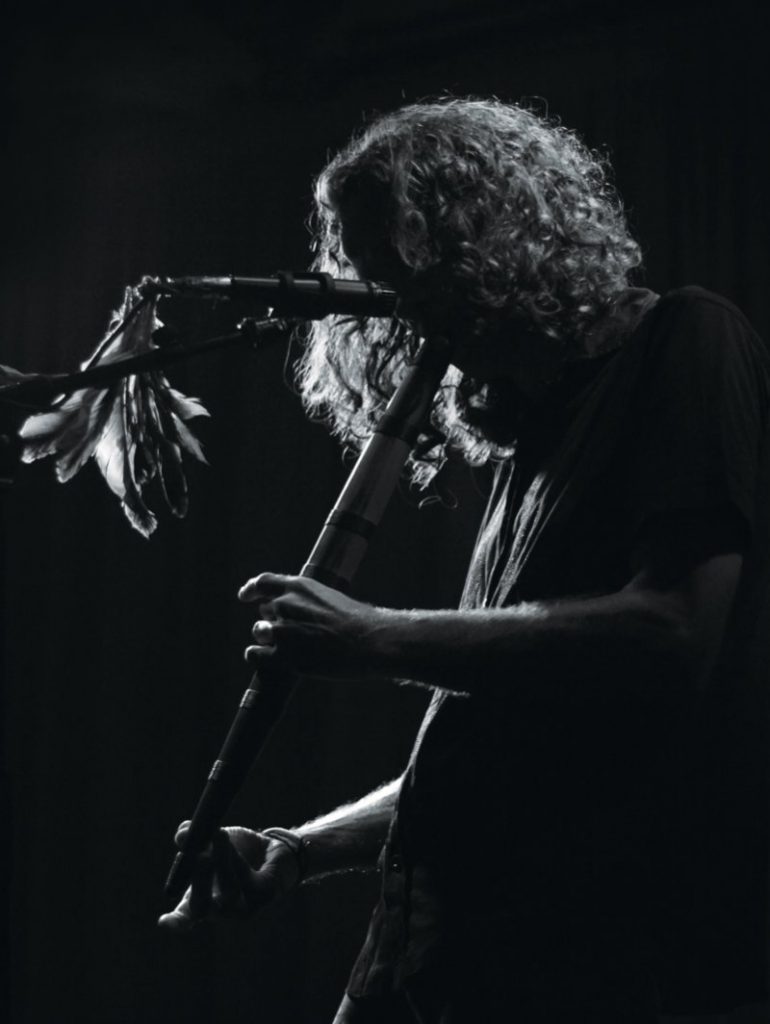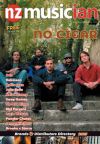Rob Thorne: Blending Ancient and Modern
Rob Thorne: Blending Ancient and Modern
Rob Thorne has been in the alt-Palmy scene for over two decades, since back when there was a strong industrial experimental noise thing happening. He has since continued to explore that free ethic, playing guitar and singing in numerous noise and hard rock bands, alongside a developing academic path that has including the making of his own traditional Māori flutes and horns – Thorne (Ngāti Tumutumu) becoming a new and original voice in the evolution of taonga pūoro. Last June he travelled to the Amazon to experience an ancient form of sound healing practice. As he tells Martyn Pepperell, the discovery of, and journey with, taonga pūoro, as an anthropologist, a musician and a Māori/Pākehā, has been a journey of rewarding self-discovery.
Palmerston North-based musician Rob Thorne’s first album on art music record label Rattle, is a record of place, time and experience. ‘Whāia Te Māramatanga’ is an immersive 78-minute listen, best suited to headphones and darkness, one where the ancient taonga pūoro music traditions of Aotearoa collide with a free noise-informed search for a future. A way forward for a once dead musical tradition which, thanks to the likes of Dr Richard Nunns, Brian Flintoff and the sadly departed Hirini Melbourne, has been given a second life over the last 30 years.
“Conceptually speaking, the album is about a journey of learning,” Thorne explains via a flickering Skype screen. “It’s a journey from not knowing yourself to knowing yourself. It’s a journey from not knowing much to knowing more. It’s a classic dark-to-light story, a journey from below to above. My journey as a musician has been about survival and living, to the point where now life is good. I want to live and I’m a better person because of being a musician.”
Written and arranged with a collection of taonga pūoro (traditional Māori wind and percussion instruments made from bone, stone, wood and shell) and modern loop pedal technology, ‘Whāia Te Māramatanga’ is also, personal meditations aside, his contribution to the continuation and development of this ancient musical tradition.
“There is a stream of tradition in there which is obvious with the use of taonga pūoro, yet overall the work is a modern work,” he says. “It is a work I have put together this century, this decade. It’s about me using taonga pūoro musically, not traditionally. It’s about experimentalism, acoustics, and the way that sound works.”
Thorne’s own musical journey began in Hamilton, where he grew up in a household that prized singing and music. Singing from age three, he picked up trumpet when just 10, moving onto guitar after passing School Certificate. After high school, he headed to Palmerston North to study at Massey University, in the process becoming involved in busking around town and playing both solo and in groups as part of the local free noise, alternative rock and experimental music scenes of the time.
By 1999 he had started a family and, following a stint in Levin, returned to Palmerston North to finally finish the BA he started all those years ago – quickly followed by post graduate diploma, then an MA in social anthropology. During this time a friend gave him his first kōauau (a short Māori flute), and he quickly found himself spending most of his time up in the gardens at Massey, learning how to play it.
 “My plan was to write my masters on the principals and community of the Palmerston North noise scene,” he recalls. “A good friend of mine who was doing post-grad at the same time, sat me down and said, ‘Look man, why are you doing your thesis on this when you’re in the gardens all the time playing your koauau? Why don’t you do your masters thesis on that?’”
“My plan was to write my masters on the principals and community of the Palmerston North noise scene,” he recalls. “A good friend of mine who was doing post-grad at the same time, sat me down and said, ‘Look man, why are you doing your thesis on this when you’re in the gardens all the time playing your koauau? Why don’t you do your masters thesis on that?’”
Finding it hard to disagree, he shifted track, and began starting to learn how to make his own instruments.
“I became entangled in various webs of mystery in regards to what I believed had been traditionally done,” he recalls. “Ten years of research and playing passed.”
Introduced to loop pedals in the late 2000s, he started using them in conjunction with his hand/home-made wood, stone, bone and shell instruments, integrating the skills he had learned from the free noise scene into his practice. He says the approach remains very minimalist, for now, his Boss RC300 used in a very simplistic way for this album.
“I began operating sound as music, rather than operating from the traditional Western composition space.”
In tandem with this, Thorne started practising Reiki palm healing as a spiritual practice to, as he puts it, “…help myself out of what was a spiritual and emotional jam at the time.”
His various interests began to spiral together.
“The Reiki and the instruments, when they came together I found I was able to finally express myself in a way that didn’t compromise who I was. I became more assured of who I was as well.
“Knowing that you are Māori, being raised to know this, is not the same as ‘being’ Māori – being able to practise, daily. The instruments, the music are my te reo. Playing the instruments has given me a direct channel into that, and now I see this as a two-way street, where it has given my ancestors a way to access me, to fulfil my ancestral role (or destiny). There is definitely a ‘bigger than both of us’ thing going on here for me, and I’ve given up ‘fighting it’.”
This energy led to performances, Government funding and his record with Rattle. A Te Waka Toi Quick Response Grant from Creative NZ was used to record three pieces; a free noise work with Campbell Kneale, some avant beats with engineer/producer Ben Horton as Uenuku, and a single epic composition titled Whāia Te Māramatanga with Steve Garden, sound engineer and head of Rattle.
During the recording Garden decided he wanted to release it as an album, placing Thorne alongside his heroes Hirni Melbourne and Nunns. Taonga pūoro’s respectful new innovator has arrived.
http://facebook.com/robthornetoipuoro

